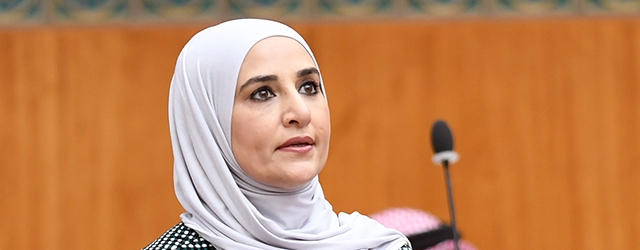A small step forward for women's rights.

In a world of men, she is the first woman to be named a finance minister. Mariam Al-Aqeel was appointed to the post in December during a reshuffle of Kuwaiti Prime Minister Sabah Al-Khalid Al-Sabah’s government; she was already serving as secretary of state for economic affairs. She will now hold both positions.
Born in 1968, Al-Aqeel has spent her career in top positions in the country’s finance and economy departments. Her new post marks a first not only for Kuwait but the entire Gulf region. As finance minister, she heads the world’s fifth-largest sovereign wealth fund, the Kuwait Investment Authority, with assets topping $592 billion.
It would be a leap, however, to claim that Al-Aqeel’s appointment shatters the kingdom’s glass ceiling once and for all, or even inflicts a dramatic crack.
“The gender imbalance in Kuwaiti politics is very real,” says Bashayer Al Majed, professor of law at Kuwait University. “In the National Assembly, there is only one elected woman MP against 49 males. And while it is true that in the new government there are two other female ministers, this has not made a huge difference.”
But Al-Aqeel’s appointment to a role that has traditionally been a man’s is an excellent development, Al Majed adds. “What is really disappointing is that as soon as a female minister is appointed, some sections of the public and certain politicians feel that they have the right to openly attack her on various pretexts,” she says. “This discourages other women and sends the wrong message.”
Data from the World Economic Forum’s Global Gender Gap Report 2020, released the day before the new finance minister’s appointment, supports Al Majed’s assessment. Kuwait ranks 122nd out 153 countries in overall gender gap. Even more striking is the dissonance between educational attainment, where Kuwait places at number 57 in the world, and political empowerment measured by the number of women in Parliament, where it sits close to the bottom of the index, at 147.
“Gender equality for all women in the country and the entire region still has a long way to go,” Al Majed says—in spite of Al-Aqeel’s important step forward.



